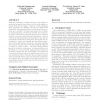Free Online Productivity Tools
i2Speak
i2Symbol
i2OCR
iTex2Img
iWeb2Print
iWeb2Shot
i2Type
iPdf2Split
iPdf2Merge
i2Bopomofo
i2Arabic
i2Style
i2Image
i2PDF
iLatex2Rtf
Sci2ools
142
Voted
MOBISYS
2009
ACM
2009
ACM
Predictive methods for improved vehicular WiFi access
With the proliferation of WiFi technology, many WiFi networks are accessible from vehicles on the road making vehicular WiFi access realistic. However, several challenges exist: long latency to establish connection to a WiFi access point (AP), lossy link performance, and frequent disconnections due to mobility. We argue that people drive on familiar routes frequently, and thus the mobility and connectivity related information along their drives can be predicted with good accuracy using historical information ? such as GPS tracks with timestamps, RF fingerprints, and link and network-layer addresses of visible APs. We exploit such information to develop new handoff and data transfer strategies. The handoff strategy reduces the connection establishment latency and also uses pre-scripted handoffs triggered by change in vehicle location. The data transfer strategy speeds up download performance by using prefetching on the APs yet to be encountered. Experimental performance evaluation reve...
Data Transfer Strategy | Lossy Link Performance | MOBISYS 2009 | Vehicular Wifi Access | Wireless Networks |
Related Content
| Added | 25 Nov 2009 |
| Updated | 25 Nov 2009 |
| Type | Conference |
| Year | 2009 |
| Where | MOBISYS |
| Authors | Pralhad Deshpande, Anand Kashyap, Chul Sung, Samir R. Das |
Comments (0)

